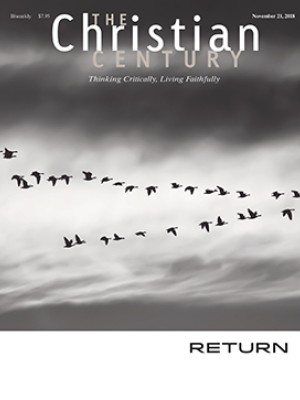Tastes of God’s kingdom at our church’s community meal
The people come, bringing something of themselves. Then they leave.

One day several years ago, a man named Steve walked into the community meal that our church hosts and said, “You know what this place is like? It is like the eighth day of creation.” He served himself a big plate of tamales and green chili, then coffee and a piece of cake. He stayed most of the afternoon. For a moment, I could see our dining room like he saw it. But then he picked up his backpack and left. He hasn’t returned in a long time.
Not long after, another person walked in and said, “This is where I come for a taste of the kingdom of God.” That person is gone now too.
Both people left me with lingering questions about this thing called the kingdom of God. What is it? Why is it both here and not here? Why does it come only in glimpses and tastes? Why do we give these ephemera that permanent-sounding name?
Maybe the kingdom of God is like Rod, who came to the community meal and washed the dishes for weeks. We talked philosophy at the sink. “I’m not a religious man,” he said. “But I think you should start the meal with a little ceremony. Thank the volunteers and the cooks, thank the people for coming.” I took his advice. Then, without warning, he was gone. He has not returned.
Read our latest issue or browse back issues.
Maybe the kingdom of God is like Vincent, who took out the recycling. At Easter, after the service, he showed me his tooth in the palm of his hand. It had come out during mass, a wretched little yellow thing. We both stared at it with a kind of horrified wonder.
Mark cooked up elk with delight. Barbara told me about her life as a physicist. Jeanne baked loaves of banana bread whenever boxes of overripe bananas were donated. Max made the best salad dressing ever. Dulce cooked pork in tomatillo sauce and told me about her life in Baja California. Rosa told me she didn’t quite trust her husband. Jim complained about our knives so often I said to him, “Bring your own or don’t chop.”
Each came and brought something of themselves: a gift, a risk, a question. Each left.
God asks Job, “Where does the lightning live? Where does the east wind dwell when it comes to divide the earth?” That’s what it feels like to be in search of the kingdom of God and to experience it in these glimpses: like looking for the lightning’s home or the place where the wind lives.
The kingdom of God is not an accomplishment. It cannot be earned, achieved, evaluated, analyzed. No formula or algorithm produces its effects. Most of the time, you can’t even quite see it, and then it is just as quickly gone.
It isn’t that I learn nothing from these glimpses, or that it is all loss. For example, I’ve learned that every time I cook, I have to cook like it is the only meal that will ever be served and these are the only people who will ever eat. I have to spend it all, completely, every time. And if someone asks me for a roll of toilet paper from the back room, I’ve learned to say yes, because just then a glimpse might come. If I say no because I am afraid that tomorrow we will run out of toilet paper, that moment is lost, ever so imperceptibly destroyed.
And everyone, everything participates. One day, a volunteer came in as I was cooking and asked, “Why is there a knife in the door?” I hadn’t seen it when I came in. Had someone just come by, moments before, and stabbed the door in a moment of anger or frustration? Had I missed it when I came in because I was thinking about something else?
I went out to look. Sure enough, there it was, stuck in the door like a message. I pulled the knife out and studied it on my way back to the kitchen. It was a pretty decent knife, and we could use one. So the knife and whoever left it, whatever their reasoning, became a part of the kingdom of God. The scar from it is still in the door’s chipped red paint.
Once upon a time, I believed that the kingdom was linear and could be built; my job was to participate in the building. But now I think it might be all I can do to show up and open my hands. If there is a kingdom, it is a kingdom of instants, a paradox of impermanence, no sooner made than gone. Maybe the kingdom passes through us like a stream. Living water cannot be long contained. In order to stay alive, it has to pass over, pass through, and disappear. The kingdom is nothing if not alive.
At communion, three-year-old Isabella busies herself with the drums that a drumming group left in the sanctuary before she was born. They are beautiful instruments, each uniquely woven and decorated. First Isabella lines them up in a row and spends a good deal of time getting them straight. Then she hands them out to each person in the communion circle. When it is time to sing the Lord’s Prayer, she shows Gary how to tap the drum in time to the music. She finds his touch too timid, so she shows him how to put a little more wrist into it. I think if we followed Isabella’s lead, we would sing the most rousing, most insistent Lord’s Prayer that has ever been sung. Thy kingdom come. Thy will be done. That would be another glimpse of the kingdom.
A version of this article appears in the print edition under the title “God’s fleeting kingdom.”






